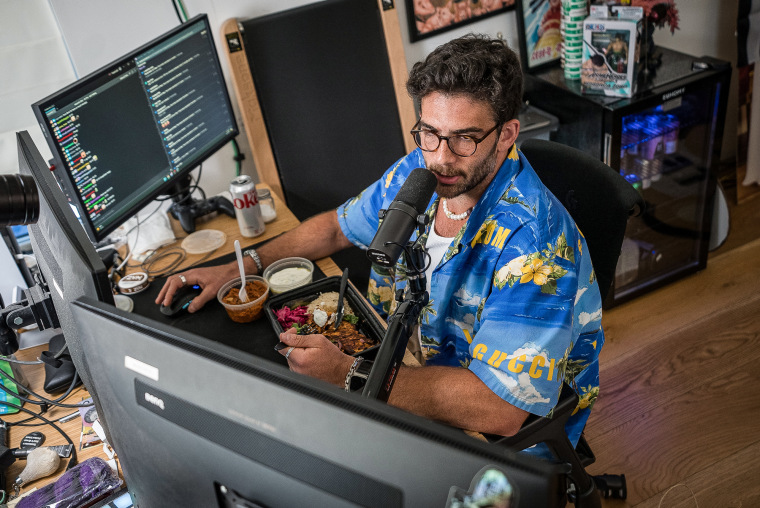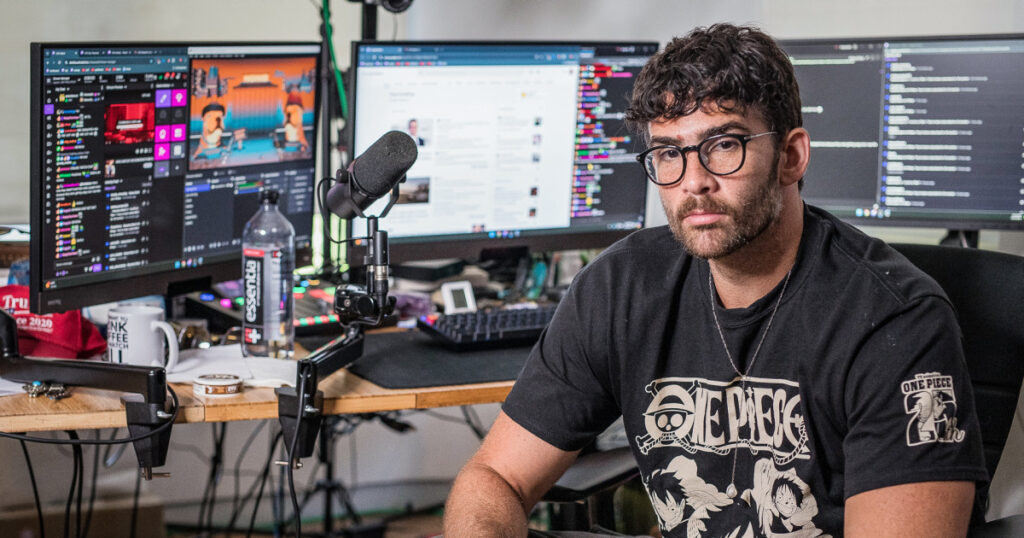Fueled by cold brew, sugar-free soda, and ZYN nicotine pouches, left-leaning streamer Hasan Pikar spends about eight hours a day, seven days a week, covering political news and election updates to a young, largely male audience.
Illuminated by three desktop monitors in a studio he set up in his Los Angeles home, Piker began his live broadcast to tens of thousands of viewers last Wednesday by talking about Rep. Ilhan Omar’s primary victory, the latest election polls, the war in Gaza and an Arizona ruling that allows unborn babies to be called unborn.
The online influencer, with 2.7 million followers on Twitch, 1.42 million subscribers on YouTube and 925,000 followers on TikTok, is one of many political creators who have rapidly grown in popularity in recent years and carved out a unique space for themselves across the broader media sphere.
The key to getting younger audiences to care about politics isn’t simply to adopt memes like the now-infamous “Brat Summer” meme that became popular after British pop star Charli XCX released her album.
“Let them know that they’re worth paying attention to, that what they want is valid and that you’re actually going to do something about it,” Piker, who is known online by the username Hasan Abi, said in a recent interview with NBC News.
Authenticity is not a new approach to content creation, but politicians have struggled to achieve it on their own, especially during election seasons when many younger voters are jaded about politics in general. Overall, young voters are not very optimistic right now, according to a September NBC News “Stay Tuned Gen Z” poll of more than 2,600 voters under the age of 30. A recent Pew Research Center survey found that many young people are now gravitating toward social media platforms for information.
Pikar, 33, rose to internet fame through “The Young Turks,” a progressive YouTube show created and hosted by his uncle, Cenk Uygur. After setting out on his own, he became a prominent voice online, attracting legions of fans and critics.
Such exposure has come with controversy: In 2021, Piker said he was briefly banned from Twitch for using a derogatory term for white people.
Still, Piker’s success as a streamer has drawn praise from other political creators, especially those targeting a similarly progressive audience.
“He kind of pioneered the field of his style of political reporting,” said Austin McNamara, known as Gremlow on Twitch, where he has about 18,500 followers.
“He’s not the first person to talk about politics on Twitch, but he’s created a space where people can actually grapple with these subjects, analyze them, and build a community around them, rather than just having arguments or yelling at each other on Discord calls. On a personal level, he’s been a very important and influential person to me.”
Sean Wiggs, known as SeanDaBlack on Twitch, also credits Piker with having a major influence on his streaming.

“I’ve been in Hasan’s community for about 45 months at this point, and he was the first person to introduce me to left-wing politics in a meaningful way,” said Wiggs, who has more than 16,000 followers on Twitch and is one of the few Black creators who engages in political commentary on the platform. “Hasan has inspired me not only to be a creator, but to be political and to fight for the people that I believe should be fighting for.” Republicans and Democrats have also realized the influence creators have on their audiences, and last year they stepped up efforts to attract creators in hopes of drawing more young voters’ attention.
Piker said he’s noticed a shift in the online political landscape in recent years: In 2020, political discourse “became much more liberal or left-leaning under Trump because of its countercultural status,” he said.
You could say he pioneered the field of the style of political reporting that he does.
-Austin McNamara, known as Gremloe on Twitch
Under President Joe Biden, the “Gamergate culture war narrative,” referring to the rise of misogynistic gaming-centric communities, has come to the forefront of commentary, Piker said. “The rise of Andrew Tate clones, crypto bros, and reactionary Shock Factor streamers has allowed those peddling false masculinity to gain a lot of territory – and it’s a lower-tier demographic known for voting for Trump,” Piker said. “This is a unique problem for Democrats.”
Last month’s Democratic National Convention in Chicago was the first to open its doors to social media content creators, recognizing 200 creators over the four-day event to boost their exposure among online audiences.
For Piker, attending the Democratic National Convention was a rare opportunity to give audiences a behind-the-scenes look. He describes himself as an entertainer whose goal is to help young people make informed decisions.
“We have more access to politicians than we did in 2020, so we want to take advantage of that,” he said, adding that he wants to “motivate Democrats to work on important issues that will help us win the election.”
Piker said he wants Democrats to address the real issues of the rising cost of living for young people, call for a ceasefire in Gaza and arms transfer from Israeli forces, and fight for social justice.
About 100 conservative influencers also attended the Republican National Convention in Milwaukee in July to create content for their audience. In recent months, former President Donald Trump has collaborated with big-name influencers popular with young men, including kickboxing streamer Adyn Ross and YouTuber Logan Paul.

Some creators say they’ve been offered money in exchange for supporting political candidates. Tana Mongeau, a content creator and host of the popular podcast Cancelled, made headlines during a recent episode when she claimed to have been offered millions of dollars in exchange for supporting a political candidate from a party she didn’t support. (Mongeau later wrote in the comments section of the video that she was “100% Democrat and voting for Kamala Harris.”) NBC News has not verified these claims. Piker, who has said he supports Harris and Minnesota Governor Tim Walz, said he has “been approached by political groups, but I’ve never been approached directly by a candidate.”
“I think they know better,” he said. “I always welcome access, but I would never change my opinion for money. I don’t know if other people who aren’t political commentators would hold themselves to the same standards.”
On his channel, he hosts streams with politicians such as Rep. Alexandria Ocasio-Cortez (D-NY) and Rep. Ro Khanna (D-Calif.).
With the election looming, Piker is a little more optimistic.
“I think Kamala Harris has done a very good job of responding to the demands of her base, at least from what I’ve seen in the last two elections, which is a pretty good thing,” he said. “The selection of Tim Walz is great, and I think that’s why a lot of young people are fired up right now because they feel like their voices are being heard.”
Come November 5, Piker will have another busy day of streaming.
“As always, I’ll be firmly seated in my chair, ready to provide live commentary,” he said. “We may have more guests, and hopefully Chapel Roan will be there.”



